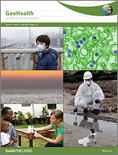
GeoHealth
Scope & Guideline
Empowering Public Health Through Environmental Insights
Introduction
Aims and Scopes
- Environmental Health Assessment:
Researching the effects of environmental pollutants (like PM2.5, ozone, and heavy metals) on human health, focusing on exposure pathways and health outcomes. - Climate Change and Health:
Investigating the implications of climate change on health, including the impacts of extreme weather events, temperature fluctuations, and changing ecosystems on public health. - Social Vulnerability and Health Disparities:
Examining how social determinants (such as race, socioeconomic status, and urbanization) influence health outcomes related to environmental exposures. - Geospatial and Machine Learning Methods:
Employing advanced statistical, geospatial, and machine learning techniques to analyze complex data sets and model health impacts from environmental factors. - Public Health Policy and Interventions:
Exploring the effectiveness of public health policies and interventions aimed at reducing environmental health risks, including community engagement and participatory research.
Trending and Emerging
- Climate Change Adaptation Strategies:
Increasing focus on adaptation strategies to mitigate health impacts from climate change, emphasizing resilient public health systems and community-level interventions. - Impact of Extreme Weather Events:
Heightened interest in understanding health outcomes associated with extreme weather events, such as floods and heatwaves, and their implications for emergency preparedness. - Integration of Citizen Science:
Emerging research utilizing citizen science to enhance data collection and community engagement in environmental health studies, promoting participatory approaches. - Mental Health and Environmental Stressors:
Growing recognition of the links between environmental factors (like climate change and pollution) and mental health outcomes, leading to more comprehensive studies in this area. - Use of Advanced Technological Tools:
Increasing incorporation of innovative technologies (like satellite remote sensing, low-cost sensors, and machine learning) to monitor environmental health and assess risks.
Declining or Waning
- Traditional Epidemiological Studies:
There is a noticeable decrease in traditional epidemiological studies that do not incorporate geospatial or environmental data, as the field moves towards more integrated and complex models. - Static Health Risk Assessments:
Research that relies on static models of health risk assessment without considering dynamic environmental changes, such as climate variability, is becoming less common. - Single-Factor Analyses:
Studies focusing solely on single environmental factors (e.g., air pollution alone) without considering interactions with socioeconomic or demographic variables are declining as the field increasingly embraces multifactorial approaches. - Historical Case Studies:
There is a waning interest in historical case studies that do not apply modern analytical techniques or that lack relevance to current public health challenges. - Localized Focus Without Broader Implications:
Research that does not connect localized environmental health issues to broader public health implications or policy discussions is less frequently published.
Similar Journals
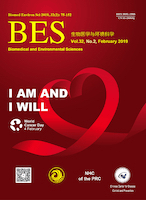
BIOMEDICAL AND ENVIRONMENTAL SCIENCES
Transforming Knowledge into Action for Global Health.Biomedical and Environmental Sciences is a distinguished peer-reviewed journal dedicated to the advancement of knowledge in the fields of health, toxicology, public health, and environmental sciences. Published by the Chinese Center for Disease Control & Prevention, this journal has been a vital platform for researchers and professionals since its inception in 1988, contributing to interdisciplinary discussions and the dissemination of pertinent research findings up to the current year, 2024. With an ISSN of 0895-3988 and an E-ISSN of 2214-0190, it holds a respectable position in the Q3 category for both Health, Toxicology and Mutagenesis, and Public Health, Environmental and Occupational Health, indicating its relevance and contribution to these significant domains. Although this journal does not offer open access, it remains an essential resource for anyone interested in understanding the intricate interplay between biomedical research and environmental health challenges. As it continues to navigate the complexities of contemporary health issues, Biomedical and Environmental Sciences is poised to facilitate vital discussions and innovations in the pursuit of improved public health outcomes globally.
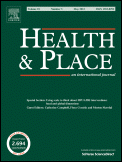
HEALTH & PLACE
Connecting Health Research with Environmental ContextsHEALTH & PLACE is a premier academic journal published by Elsevier Science Ltd, focusing on the intersection of health and geographical contexts. With an impressive impact factor and a Q1 classification across multiple categories including Geography, Health (Social Science), and Public Health, this journal serves as an essential platform for disseminating groundbreaking research and innovative insights into how place influences health outcomes. Established in 1995, HEALTH & PLACE offers a comprehensive view of contemporary health challenges through a social science lens, making it invaluable for researchers, practitioners, and policymakers alike. Although it operates under a traditional subscription model, the high visibility afforded by its ranking—elevating it to the top tier of its field—ensures that its rigorous peer-reviewed articles reach a wide audience. With a convergence of critical topics relevant to life-span studies and environmental health, the journal not only enriches academic discourse but also informs practical applications in public health initiatives.

Asian Journal of Atmospheric Environment
Bridging Science and Sustainability for a Better TomorrowAsian Journal of Atmospheric Environment, published by SPRINGERNATURE, is a renowned open-access journal established in 2007, dedicated to advancing research in the fields of Atmospheric Science and Environmental Science. With an ISSN of 1976-6912 and E-ISSN of 2287-1160, the journal aims to offer a platform for the dissemination of cutting-edge research findings, reviews, and innovative methodologies addressing critical environmental issues faced in Asian and global contexts. As of 2023, it holds a respectable Q3 ranking in both Atmospheric Science and Environmental Science categories, positioning itself within the competitive landscape of scholarly publications. The journal is indexed in Scopus and emphasizes its commitment to enhancing accessibility and widespread dissemination of knowledge, making significant contributions to environmental sustainability and atmospheric research. Researchers, professionals, and students are encouraged to engage with the journal as it continues to evolve through its converged years, providing a vital resource for exploring and addressing the challenges that shape our atmospheric environment.

International Journal of Health Geographics
Unlocking the power of geography in public health.International Journal of Health Geographics is a premier open access journal published by BMC, dedicated to advancing the field of health geography by facilitating the dissemination of research that intersects health, the environment, and geographic information systems. Since its inception in 2002, the journal has become a vital resource for scholars and practitioners in public health, environmental science, and spatial data analysis, consistently ranking in the Q1 category across multiple disciplines, including Public Health, Business Management, and Computer Science. With an impressive Scopus ranking of #39/665 in Public Health and a notable 94th percentile standing, the journal is committed to publishing high-quality, impactful research that addresses current public health challenges through a geographic lens. Its open access model ensures that knowledge is readily available to researchers, policymakers, and the public, reinforcing its role as a key contributor to evidence-based decision-making in health and environmental policies. As it converges through 2024, the International Journal of Health Geographics continues to be an essential publication for advancing interdisciplinary understanding and promoting innovative solutions in health geography.
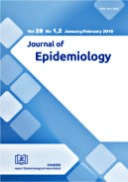
JOURNAL OF EPIDEMIOLOGY
Exploring the intersection of health and society.JOURNAL OF EPIDEMIOLOGY is a premier peer-reviewed journal published by the JAPAN EPIDEMIOLOGICAL ASSOCIATION dedicated to advancing the field of epidemiology and public health. With an impressive impact factor and recognition as a Q1 journal in both the epidemiology and miscellaneous medicine categories, it ranks in the top percentile of its field, occupying the 28th position out of 148 journals in epidemiology according to Scopus. Since its inception in 1991, this open access journal has provided researchers, practitioners, and students with valuable insights and findings that shape healthcare policies and practices globally. The journal covers a broad range of topics within epidemiology, fostering a multidisciplinary approach to understanding and addressing health challenges. With a commitment to high-quality research and accessibility, the JOURNAL OF EPIDEMIOLOGY plays a crucial role in the dissemination of knowledge and best practices within the public health community.

Environmental Health and Preventive Medicine
Transforming research into preventive action.Environmental Health and Preventive Medicine is a leading, peer-reviewed journal published by the Japanese Society for Hygiene, dedicated to advancing the field of environmental health and preventive medicine. With an impressive Impact Factor and ranking within the top quintile (Q1) in both Medicine (miscellaneous) and Public Health, Environmental and Occupational Health categories, this journal is recognized for its high-quality research and significant contributions to public health discussions globally. Established in 1996 and transitioning to an Open Access model since 2008, it provides unrestricted access to important findings that serve a diverse audience, including researchers, practitioners, and students. The journal's scope encompasses a wide range of topics essential for understanding environmental health issues and formulating effective preventive strategies, making it an invaluable resource for anyone engaged in health policy, environmental science, or community health initiatives. With an active readership and impactful research, Environmental Health and Preventive Medicine continues to influence the future direction of public health and environmental policies.

Mausam
Navigating the Complexities of Climate and GeophysicsMausam, an esteemed publication by the India Meteorological Department, serves as a pivotal platform for advancing research in the fields of atmospheric science and geophysics. With its origins tracing back to 1979, this journal has consistently provided valuable insights into weather patterns, climatic variations, and geophysical phenomena, making it a crucial resource for researchers and professionals in Earth and Planetary Sciences. Although it currently holds a Q4 rating in Atmospheric Science and Q3 in Geophysics as of 2023, the journal's commitment to rigorous scientific exploration fosters an enriching environment for emerging studies. The journal is indexed in Scopus with specific rankings highlighting its scope, ranking #116 out of 165 in Geophysics, and #130 out of 148 in Atmospheric Science. This reflects a growing global interest in the journal's contributions to vital areas of scientific inquiry. While Mausam is not available as an open-access journal, it remains accessible to a wide audience, providing critical research that informs both local and global meteorological practices. Researchers, students, and professionals alike are encouraged to engage with its rich archive, as it continues to evolve to meet the needs of the scientific community.
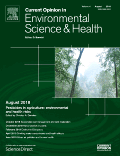
Current Opinion in Environmental Science & Health
Exploring the Nexus of Environment and HealthCurrent Opinion in Environmental Science & Health, published by Elsevier, is a leading journal dedicated to the burgeoning intersection of environmental science and health studies. With an impact factor that underscores its prominence—ranked in the Q1 category across critical disciplines such as Environmental Chemistry, Health, Toxicology, and Public Health—this journal serves as an essential resource for researchers, professionals, and students seeking to explore innovative approaches and the latest findings in the realm of environmental health. The journal's rigorous selection process and high-ranking positions in Scopus reflect its commitment to showcasing high-quality, impactful research, making it a vital platform for disseminating knowledge and fostering discussion. With access options that prioritize research outreach and engagement, Current Opinion in Environmental Science & Health continues to chart the path for future advancements in environmental and public health, solidifying its role as a cornerstone for scholarly discourse in this vital field.

Air Quality Atmosphere and Health
Innovating Research at the Intersection of Environment and HealthAir Quality, Atmosphere and Health is a leading interdisciplinary journal published by Springer, focusing on the intricate relationship between air quality and public health. With roots dating back to 2008, the journal has established itself as a pivotal resource for researchers and professionals in the fields of Atmospheric Science, Health, Toxicology and Mutagenesis, and Pollution Management and Policy, achieving a commendable Q2 ranking across multiple categories in 2023. The journal’s rigorous peer-review process ensures that it publishes high-quality research that addresses contemporary challenges in air quality management and its impact on health outcomes. With no Open Access option, the journal maintains a model that prioritizes valuable insights for subscription holders, making it an essential reference point for advancing knowledge on environmental health issues. The journal is based in the Netherlands and contributes significantly to the understanding of atmospheric pollutants and their effects, evidenced by its strong Scopus rankings, positioning it in the top percentiles of various environmental science categories.

Exposure and Health
Innovating research to inform global health practices.Exposure and Health is a pioneering journal published by Springer, specializing in the interdisciplinary fields of health, toxicology, and environmental sciences. With an ISSN of 2451-9766 and E-ISSN of 2451-9685, this open-access journal exemplifies a commitment to disseminating high-quality research that informs public health practices and policies globally. Situated in the Netherlands, it boasts an impressive impact factor and ranks in the top quartile (Q1) across multiple categories in the 2023 Scopus rankings, including Health, Toxicology and Mutagenesis, Pollution, and Water Science and Technology. The journal is dedicated to advancing knowledge on the interactions between environmental factors and health outcomes, making it a vital resource for researchers, professionals, and students in these critical fields. Exposure and Health actively encourages submissions that address the challenges of exposure assessment, risk management, and the promotion of sustainable public health initiatives.